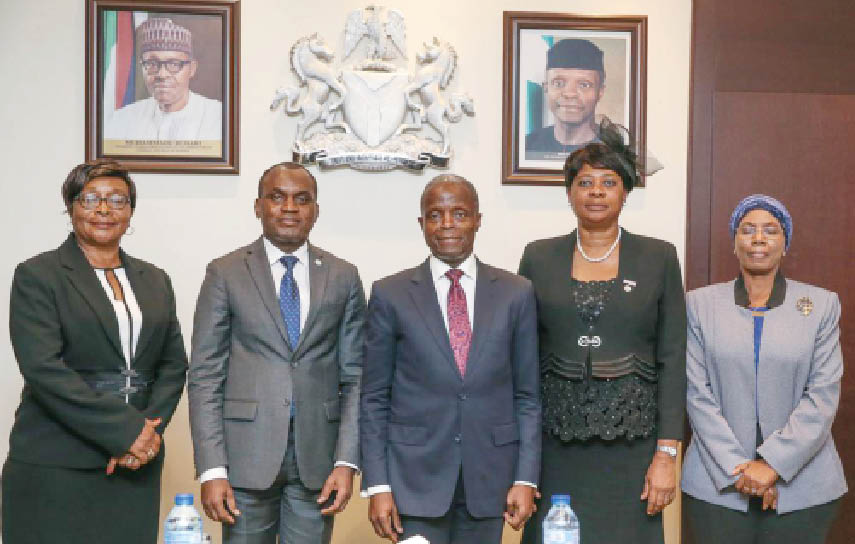Nigeria to activate access to African Court
Nigeria will soon make a declaration which will allow Nigerians and civil society groups access to justice through the African Court, Vice President Yemi Osinbajo has said. The vice president stated this while receiving a delegation of the African Court of the African Union (AU) at the State House in Abuja on Thursday. Nigeria had […]

Vice President Yemi Osinbajo (middle), President of the African Court, Justice Sylvain Ore (2nd from left), and other judges during a visit to the State House in Abuja on Thursday.
Nigeria will soon make a declaration which will allow Nigerians and civil society groups access to justice through the African Court, Vice President Yemi Osinbajo has said.
The vice president stated this while receiving a delegation of the African Court of the African Union (AU) at the State House in Abuja on Thursday.
Nigeria had ratified the protocol establishing the court in 2004 but is yet to make the declaration as required under Article 34(6) of the protocol establishing the court for direct access to the court by individuals and Non-Governmental Organisations (NGOs).
Osinbajo assured the delegation that there would be consultations among relevant authorities to consider making the declaration to allow NGOs and individuals to have direct access to the court.
In a statement signed by the Registrar of the court, Robert Eno, Osinbajo reiterated Nigeria’s commitment to the African Charter on Human and Peoples’ Rights and the creation of the court, adding that its establishment guaranteed protection of human rights in Africa.
“I commend the work of the African Court on the protection of human rights,” Osinbajo said.
The leader of the delegation and President of the African Court, Justice Sylvain Oré, thanked the vice president on the making of the declaration, which he said underscored Nigeria’s influential position and its unwavering commitment to the peace and stability in the region and in the continent.
“For the court to achieve its objectives and further strengthen African human rights systems, a greater number of countries must ratify the protocol and make the declaration under Article 34(6),” Justice Ore emphasised.
He thanked the Nigerian Government for the warm reception accorded the court’s delegation.
The delegation met with key officials of government and also conducted a sensitisation seminar for stakeholders in Abuja.
Among the key officials met were the Minister of Foreign Affairs, Geoffrey Onyeama, and the Attorney-General and Minister of Justice, Abubakar Malami (SAN). They also held discussions with the Executive Secretary, National Human Rights Commission and his team, and the President of the Nigerian Bar Association (NBA), Paul Usoro (SAN), and his team.
The African Court delegation kick-started its trip by engaging the ECOWAS Court of Justice in a judicial dialogue as a reciprocal benchmarking visit from 29 to 30 April.
The reciprocal visit follows the inaugural visit by the ECOWAS Court of Justice to the Arusha-based African Court in February, 2018, during which a Memorandum of Understanding (MoU) was signed.
The President of the African Court said: “The judicial dialogue with the ECOWAS Court of Justice has enhanced judicial cooperation and shared experiences between the two courts.’’
The protocol was signed in June, 1998. Of the 30 out of 55 AU member states which ratified it, only nine state parties to the protocol have made the declaration under Article 34(6). These are Burkina Faso, Benin, Ghana, Gambia, Cote d’Ivoire, Mali, Malawi, Tanzania and Tunisia.
The court is composed of 11 judges: nationals of member states of the AU elected in their individual capacities. Six of the justices are females for the first time in fulfilment of the requirement for adequate gender parity provided for in Article 12(2) and Article 14(3) of the protocol establishing the court.
